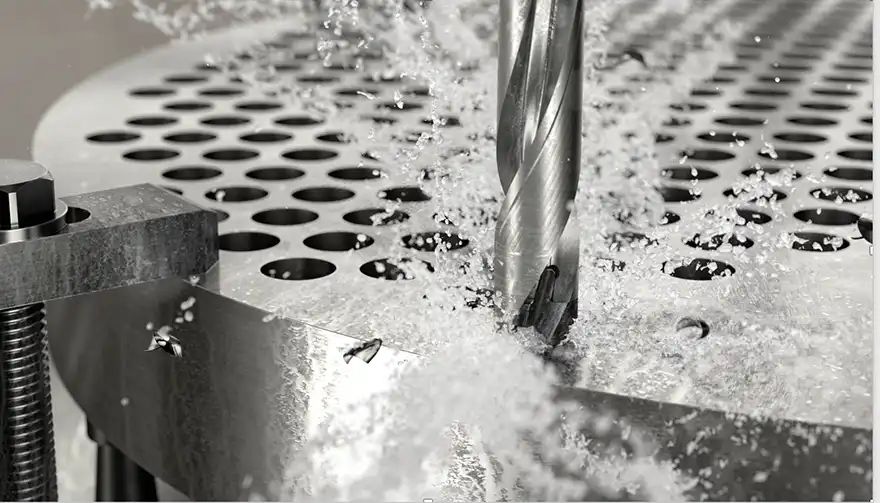
In March 2025,
Sandvik Coromant, a specialist in metal machining tools and solutions introduced CoroDrill DE10. Featuring universal -M5 geometry and plug-and-play functionality — with no need for a pilot drill — CoroDrill DE10 represents a significant advancement in high-volume hole making, offering faster setup, improved performance and greater versatility across a range of materials.
Here, Mikael Carlsson, global product specialist for indexable rotating tools at Sandvik Coromant, traces how customer needs and open collaboration shaped the development of the second-generation exchangeable-tip drill.
The journey to CoroDrill DE10 began with the launch of CoroDrill 870, designed to improve drilling efficiency with an exchangeable-tip system. As customer demands evolved, it became clear that there was a growing need in the market for greater reliability, longer tool life and easier handling. In response, Sandvik Coromant launched an ambitious project to develop a drill that would deliver outstanding productivity, enhanced ease of use and seamless adaptability to meet modern manufacturing demands.
One of the biggest challenges in manufacturing today is the growing skills gap. Operators increasingly need tools that are not only high-performing but also easy to select, set up and use. With this in mind, the CoroDrill DE10 was designed to be intuitive, allowing operators of all skill levels to achieve optimal results with minimal setup time.
The tool also had to offer exceptional versatility to enable high-volume hole making across a wide range of materials, including steel, stainless steel, heat resistant super alloys, cast iron, non-ferrous materials and hardened steel. In addition, it needed to be extremely durable to ensure a long tool life, even under demanding cutting parameters that typically accelerate wear and tear.
Innovative and thorough approachCreating such a reliable and operator-friendly tool that is capable of meeting a wide range of industry needs required an innovative and thorough approach to designing, testing and manufacturing. At Sandvik Coromant, product development follows a highly structured process — it starts with conceptual designs, then transitions to in-house prototyping and lab testing, before finally undergoing real-world customer trials. Keeping manufacturing and testing under one roof allowed the team to iterate quickly, refining every detail through multiple feedback loops before finalising the design.
CoroDrill DE10 features a high-strength steel drill body and a patented drill tip-to-body interface, providing excellent stability and performance. Another standout feature of the tool is its injection-molded drill tip — a first for Sandvik Coromant. Powder injection moulding, a technique often used for plastics, was adapted for solid carbide, allowing for a more detailed and optimised drill tip design. Once the centre of the drill tip had been refined for maximum reliability and precision, the team reinforced the corners to improve performance, productivity and hole quality. The result is a drill tip that delivers both long-lasting durability and consistent, high-quality hole-making across a wide range of cutting parameters.
However, developing CoroDrill DE10 came with its share of challenges, requiring continuous refinement based on rigorous testing and customer feedback. The testing process began with a focus on durability and process security, as the team extensively stress-tested the tool’s strength, longevity and performance under extreme conditions. With this solid foundation established, they then fine-tuned the drill’s geometry to optimise feed rates, reduce cutting forces and enhance hole quality.
Modern manufacturing techniques, including the use of digital twins, played a key role in refining the design. By simulating the drill’s performance in a virtual environment, the R&D team could push the tool to its limits, effectively trying to break it to identify areas for improvement. This virtual testing also provided valuable insights into the manufacturability of the design, ensuring the drill was not only high-performing but also scalable for mass production.
Customer insights were also instrumental throughout development, from the project’s conception all the way to late-stage testing. Feedback from users of CoroDrill 870 shaped the foundation of CoroDrill DE10 and field testing further influenced refinements, ensuring the final design addressed requirements and challenges identified by end users.
Improved ergonomicsOne notable change introduced late in development was the plastic handle with a collar set for the drill tip mounting key. Although every drill box includes a standard key that can be used across the entire assortment, a plastic handle for the mounting key is also available to order separately. This is because, during field testing, some users raised concerns about the safety and ease of use of the key, which led the team to develop a plastic handle to improve ergonomics and eliminate the risk of carbide splinters.
Ulrik Sunnvius, senior R&D engineer at Sandvik Coromant, a key member of the CoroDrill DE10 development team, said: “Customer feedback is crucial to our development process. It allows us to make real-world adjustments that ensure the tool not only meets but exceeds the needs of the people who rely on it. This is why we created the plastic handle key — to provide operators with an option for enhanced handling and safety.”
The success of CoroDrill DE10 is a testament to the power of teamwork. The development process brought together specialists across multiple disciplines, ensuring the final product was shaped by diverse expertise. A uniquely Scandinavian work culture, where hierarchy takes a backseat to open dialogue, allowed the team to push boundaries and create a drill that truly meets customer needs. From early customer research and R&D to field-testing and manufacturing, teams worked together seamlessly to bring the tool to life.
Mr Sunnvius explained: “One of the biggest enablers of our success is the way we collaborate. There are no barriers — anyone can ask questions and contribute ideas. That free flow of knowledge is what allows us to keep innovating and pushing boundaries.”